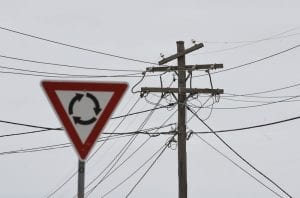Big fossil-fuel-based utilities in the United Kingdom are overcharging their customers, going on a “’gorging spree” while they still can, according a UK-based expert.
Colin Baines, speaking at “The Great Energy Debate”, held in Manchester on Tuesday, gave a presentation – “3D Energy Transition and implications for utilities” – which outlined political and economic challenges that will be familiar to Australian and overseas readers of Reneweconomy. Baines pegged his presentation around two fascinating reports.
The first, “Wise Minds: Insights from energy industry and political leaders on the rapidly changing UK energy system,” was published in April by the NGO Forum for the Future and the organisation Baines works for, Friends Provident Foundation.
They had convened recent “ex” figures from business (former CEOs) and the state (ex-ministers and retired mandarins), who would have both relevant insights and the freedom and willingness to speak their minds.
The questions these grizzled veterans were tackling were around how the UK energy system is changing in response to four Ds; decentralisation, democratisation, digitisation and decarbonisation.
Baines pointed out that there used to be 80 power stations in the UK, but that this large centralised model is disintegrating, in the face of the growth of renewable energy sources but also new possibilities around peer-to-peer energy trading (blockchain etc).
Baines made the point that industry is, unsurprisingly, lobbying against both democratisation and decarbonisation (the how is the subject of the second report, discussed below) but believes this is a losing battle “Policy [written by and for incumbents] might slow it down, but it’s going to happen… they can draw it out, but they will damage their own companies.”
He compared the situation to that of Kodak, which didn’t respond fast enough and has moved from behemoth to niche player.
He cited reports by UBS – “Power is no longer something that is exclusively produced by huge, centralised units owned by large utilities. By 2025, everybody will be able to produce and store power, and it will be green and cost competitive.”
and Citibank “in their current form utilities in developed economies could see the size of their market shrink by more than 50%.”
The second report “Gridlock in the UK Power markets”, written by Influence Map, looks at the various techniques used by lobbyists. It mournfully concludes that industry has completely captured the regulatory process.
Recent examples of this include the reduction of subsidies for small-scale renewable energy, lobbying for ongoing fossil fuel subsidies and electricity code changes which support incumbents (Australian readers will doubtless be puzzled, since this is so very foreign to their experience.
Irony aside, until the arrival of Audrey Zibelman at AEMO, the same could be said of Australia. The recent Energy Security Board could be seen as a way of re-insulating the regulatory system).
Baines believes the Big Six’s business model is based around its (current) ability to maintain the status quo through regulatory capture. The UK regulator, Ofgem, believes the Big 6 have overcharged customers by £1bn – some “gorging spree!” (others put the number much higher).
Friends Provident is in the process of asking the Big Six a series of questions about their behaviour and plans. The report will be published soon.
Baines and other panellists believe that intelligent utilities may move from providing energy per se to a whole range of services (after all, SMART grids will require maintenance, local communities will not be able to have the relevant skills and resources for every eventuality.)
However, there will not be a single model for all incumbents; there will be a number of roles in the value chain.
One straw in the wind is a pilot project by Centrica in Cornwall, looking at a local energy market (though cynics might ask whether having a multinational shaping new institutions is a good idea).
The event was organised by Carbon Coop, a Manchester-based social enterprise which is helping individuals and communities lower their housing and energy carbon footprints and providing skills, training and services. It has posted the three speakers’ presentations here. It has recently devised a game ‘The Great Energy Escape’ for children.
The debate’ s other speakers were Tom Law from Electricity Northwest (a transmission company) who spoke on the challenges ahead in engaging with customers, and Emilia Melville, an energy systems engineer, who spoke eloquently on Energy Democracy – who participates?
Who has the skills and resources to do so?
She referred to various organisations which are trying to increase not just participation rates but the capacity to participate in the big energy decisions of the (near!) future, such as Trade Unions for Energy Democracy, We Own It and Switched on London.
The evening had opened with the facilitator asking two questions which he asks at all such events (and should indeed be standard at any energy-related event)
- do you feel ownership of the energy system ? (a couple of hands – belonging to people with solar panels on their roofs or shares in energy co-operatives- went up)
- do you feel you have the information and agency to participate in the energy system?
Given that this was a self-selected audience of the concerned, and that there are enormous decisions and changes pending on how energy systems are organised, it is mildly terrifying that so few hands ever go up.
Marc Hudson is a PhD Candidate, Sustainable Consumption Institute, University of Manchester and a regular contributor to RenewEconomy.










